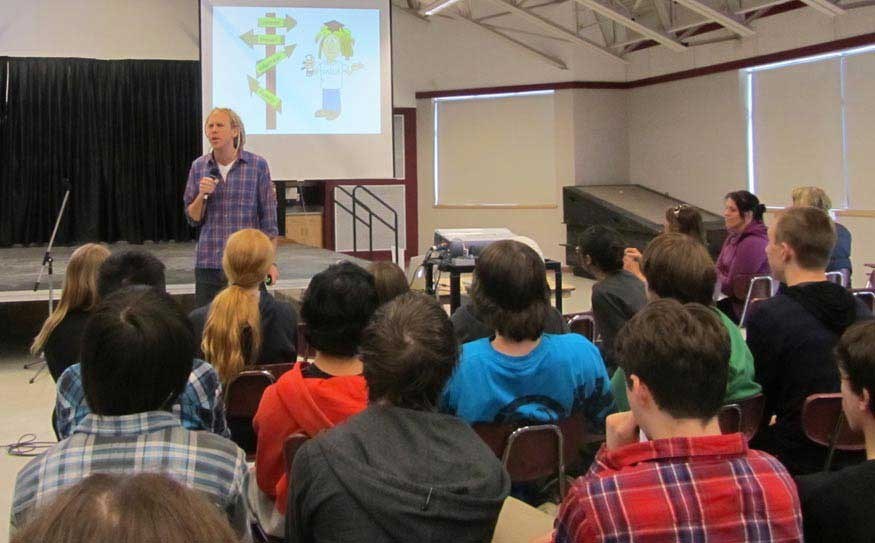Whistler Secondary School students were able to explore potential careers by listening to a man who was once without a plan, but who made his quest for finding out what he could do, his mission.
Like a lot of people, Vancouver college student Sean Aiken completed a degree and travelled a bit, but was hit with feelings of uncertainty about what to do next.
After a family conference with his parents and sister throwing suggestions at him, he hit upon an unusual idea — instead of committing himself to the first job that came along, why not commit to one new job each week for a year to find out what suited him?
His solution, the One Week Job Project. So between March 2007 and February 2008, Aiken tried out a wide variety of careers, including astronomer, cowboy, mayor, stockbroker and fashion buyer, in cities all over North America.
On Thursday, April 19, he brought the message to 250 WSS students, fitting enough since his job in Week One was as a bungee operator at Whistler Bungee, an appropriate experience since his project was all about "taking the plunge."
Stephanie Reesor, Chair of the Whistler Secondary School's Parent Advisory Council, said she became aware of the One-Week Job concept when arranging a "parents-as-career-coaches program" last fall. She found the idea and Aiken's story compelling and considered it a good fit for high school students.
"We were looking for ways to inspire the students, whether they know what they want to do or not," she said.
Now 30, Aiken speaks frequently to college and high school students to remind them that making a choice about work and life is supremely important — and ultimately up to them.
"One of the most important things I heard over the year was the saying from people who had been working for a long time: 'If I could do it over again, I wish I could have acted without fear of what others thought,'" he said.
As well as describing the best job (teaching, working with the Canadian Forces) and the worst (a Couier De Bois, collecting wild products in a hot, bug-filled swamp outside Montreal), he offered guidance.
Advice to the students included:
•It's fine not to know what to do but it is important to choose something;
•Adults themselves often don't know what they want to be;
•Expect and welcome career changes through life; and
•Focus at a young age on enjoyment and learning.
In the end, Aiken's project resulted in a website/blog, a book and a documentary and has led to many public speaking engagements for students who, themselves, have to decide where they are headed in their lives.
Over $20,000 was raised during the year of his project, which was donated to charity, and has led others to taking the challenge on elsewhere in the world, including Australia and the U.S.
In an interview, Aiken said One Week Project students have spoken at 42 events from Vancouver to Halifax, at schools but also at companies.
"With high school kids it's like they almost feel a sense of relief that it's OK not to know what they want to do," he said.
"One girl came up to me and said that she always though it would be cool to own a bakery when she retires, but then realized after hearing me speak that she didn't have to wait. She could do it now. It's that shift in perspective."
Grade 10 student Edi Schreyer said that like Aiken he was torn between several ideas for his future; construction, which his father does or car design, which his uncle does.
"You can try different things and see what you like better," he said.
"My dad runs a construction company and I can go hang out with him and see what he does, I like that. Being a boss means doing a lot... my Mom is the accountant for the company, but I don't like math so much."




